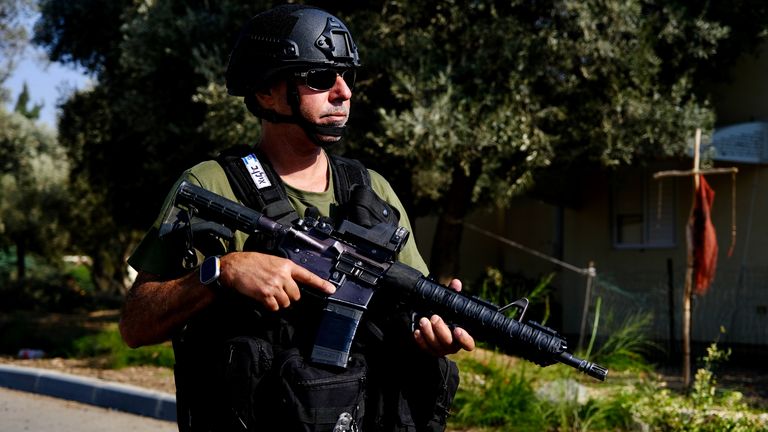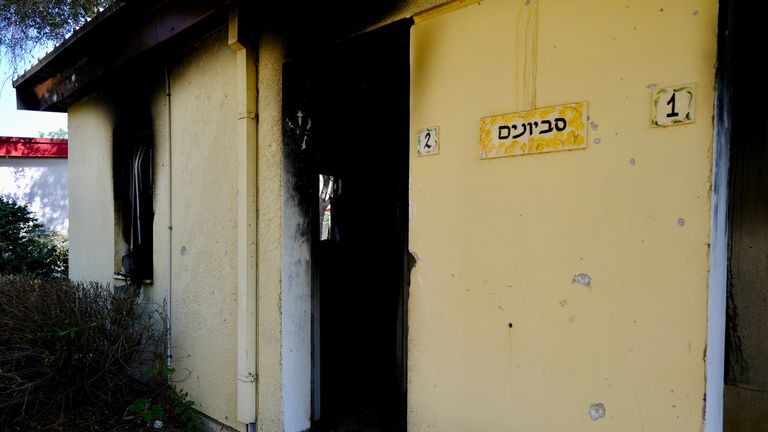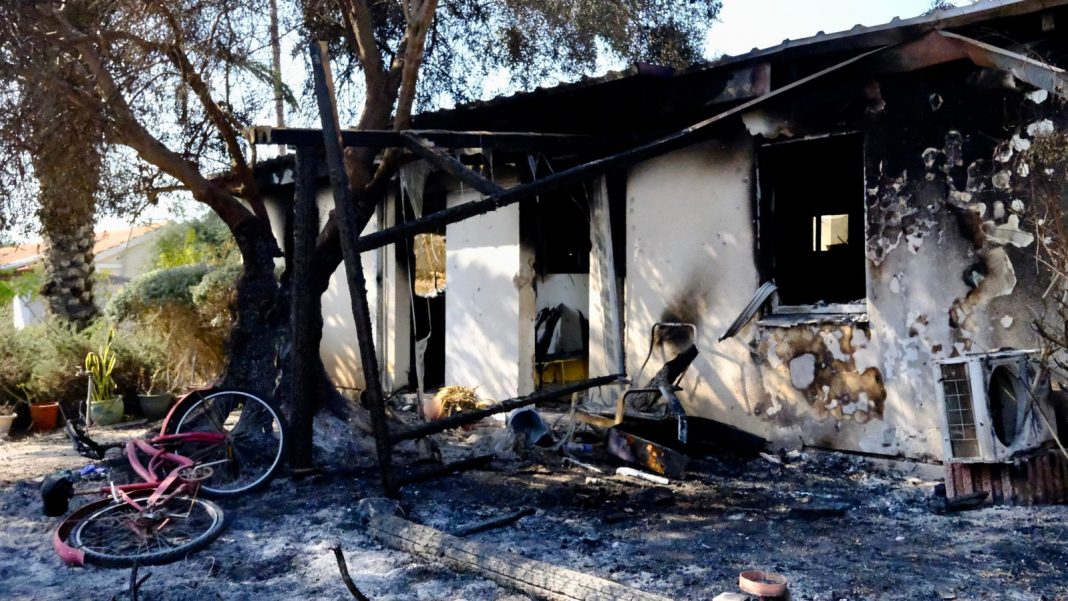Shortly before 9pm on Tuesday evening, a Hamas fighter attempted to kill an Israeli soldier with a knife.
The attack took place at Kibbutz Re’im in southern Israel, about four kilometres (2.5 miles) from the border with Gaza.
The man was shot dead by another soldier.
What is remarkable is that the would-be assassin had been hiding in the kibbutz since Saturday morning when he and about 50 fighters stormed the community.
The Israeli defence forces thought they’d cleared the kibbutz but evidently, they were wrong – another search of the entire complex is under way.
This story, told to me by the head of security at the kibbutz, shows what many have been hearing about for days.
The Hamas fighters came over the border with ease and might not have returned to Gaza.
This is important because as Israel considers a ground offensive in Gaza, the government and the military can hardly expect their soldiers to cross the wire if they think the enemy is still behind them.
Over the past few days, Israel has struggled to convincingly take control of the border line.
Only on Tuesday, I saw defence force soldiers firing machine guns at targets inside Israeli territory, while helicopter gunships attacked Hamas positions just a few kilometres inside the Gaza Strip.
The military has now moved into Kibbutz Re’im.
Bullets on the ground at Kibbutz Re’im
It is adjacent to where the Supernova music festival took place on Saturday – the scene of the murder of over 250 young men and women.
This small community was attacked by about 50 heavily-armed men intent on killing and kidnapping.
Eilan is the head of security here. He is a veteran border guard volunteer – he doesn’t want his last name used.
He, along with other community volunteers, led the fight back against Hamas.
He walked me through the remains of the community scarred by an intense fight.

Eilan, the security chief at Kibbutz Re’im
Standing in front of the rubble of two houses and a bomb shelter, he described what they had to do to stop the gunmen from firing at them.
He said the Hamas fighters were in the buildings.
“They came and started shooting from this house, we brought the tank, we launched a missile, it didn’t stop.
“We launched a second one, and it didn’t stop, we launched the third one, and it didn’t stop – it stopped when we came with the tractor and we broke the walls, we destroyed everything, as you can see.”
Eilan said that this was a different type of Hamas tactic, where usually attacks inside Israel are suicide missions. This marked a significant change of strategy.
They intended to go home to Gaza having killed or abducted Israelis.
“This is a nightmare, we never thought this could happen, that they’re coming with so many terrorists,” he told me.
“Now it’s completely different, completely different, they came to murder and to take hostages to the Gaza Strip, and you can see the evil that they took families, they took children.”
Read more:
Gaza runs out of electricity
What we know about viral report of beheaded babies in Israel
US sends technical experts to assist in hostage recovery in Gaza

A burnt-out nursery school at Kibbutz Re’im
Less than a kilometre away from this community, the Supernova music festival was in full flow when the attack on the kibbutz began.
The mass murder of so many young people has sent shockwaves through Israel, but Eilan believes the real targets of the attack were the kibbutzim that border Gaza, and not the party itself.
He thinks it was an opportunistic attack on defenceless youngsters who’d been out all night.
“Not the party, I think it’s not the reason, the party, no, I think it’s by mistake.”
I asked him if he thought they were simply in the wrong place at the wrong time. “Yes”, he nodded.
The entire community has now been moved away and Eilan says he is unsure how many will ever come back.
Eilan told me that seven people from Kibbutz Re’im were killed, and one was taken hostage.
He said people here wanted to live in peace with the Palestinians, but after this attack, once considered impossible, everything has changed.
“Our kibbutz and all this region thought about living together with the Palestinians, with the people. I employed them, I gave them jobs, money, a salary, but now I changed my mind,” he explained.
“I don’t want any peace with them, I don’t want to deal with them at all, and if I need to consider my children or the Palestinian children, I would think about my children – never again.”







